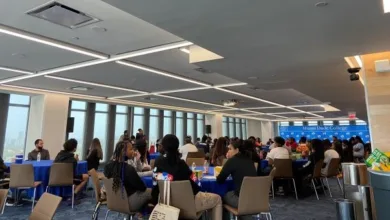Caribbean region needs to forge partnerships for better health care
Greater Georgetown, Guyana – Jamaica’s Chief Medical Officer, Dr Sheila Campbell-Forrester has underscored the need for the Caribbean Region to continue to forge partnerships with Third States and international organizations in providing quality health care for its peoples.
Jamaica’s CMO was referring to the Caribbean Community (CARICOM) / Spain Cooperation project on Support for the Prevention and Control of Cervical Cancer in the Region, under which regional health personnel including gynaecologists and obstetricians are being trained in diagnosing pre-cancerous and cancerous legions with the use of a colposcope.
In the first phase of the training, 30 gynecologists and obstetricians are being trained in Colposcopy and will be instrumental in training other health personnel in the second phase of the project. The Government of Spain is donating colposcopes along with assisting in the funding of the training exercise.
Dr Campbell-Forrester told participants at a five-day regional workshop for gynecologists and obstetricians in Jamaica that the CARICOM Secretariat was creative and aggressive in its drive to secure funding for regional activities at a time of global crunch when most governments were cutting back, and expressed pleasure that health care was still high on the agenda of the Community.
“We have to maintain this kind of action and thinking in all that we do. Partnerships have to be forged and we have to work together if we are going to move past the difficulties now facing us as a region and across the globe,” she said.
Dr Campbell-Forrester told participants at the closing ceremony that the project was one that signified the need for a unified effort to fight diseases and noted that among the regional health priorities under the third phase of the Caribbean Cooperation in Health (CCH) Project was helping Caribbean people attain the highest level of health and ensuring that health services in the Caribbean were “affordable, accessible, accountable and oriented to primary health care.”
The CMO added however that the region’s quest for a modern health care system had to include training as priority: “Our objectives will not be realized if our workers are not trained to use the latest technology that is available in their field. This way, we ensure that we keep abreast of developments with regard to new innovations and discoveries that may result in a better standard of care for our patients.”
Noting that Cervical Cancer was the second leading form of cancer among Jamaica’s women, Dr Campbell-Forrester stated that for her country, the training was timely as it supported the government’s initiative to provide free quality health care for the country’s poor – an initiative, she said that was primarily driven by the training of Jamaica’s health care workers to adopt new technologies and globally accepted methods of treatment and care for patients. In this regard, she thanked the Government of Spain for providing the money to facilitate the transfer of knowledge and the purchase of equipment for the region’s health sector. She then challenged participants to spread the knowledge and the skills that they had acquired to their colleagues and to the organizations to which they were attached.
Also making remarks at the closing ceremony was Mr Earl Jarrett, Chairman of the Jamaica Cancer Society, who cited some of the major challenges facing Jamaica in battling cervical cancer, as access to standardized screening and equipment as well as access to rural women and women in the inner-city communities.
One of the colposcopes for Jamaica was presented by Ms Marta Mendez Diaz, Deputy Head of Mission, Embassy of Spain, Jamaica, to Professor Horace Fletcher who accepted on behalf of the University of the West Indies (UWI) Mona and the Jamaican Government. Each country that participated in the Training-of-Trainers intervention will also receive one colposcope.
The second leg of the Training-of-Trainers intervention will take place in Trinidad and Tobago on June 22-26 2009.


